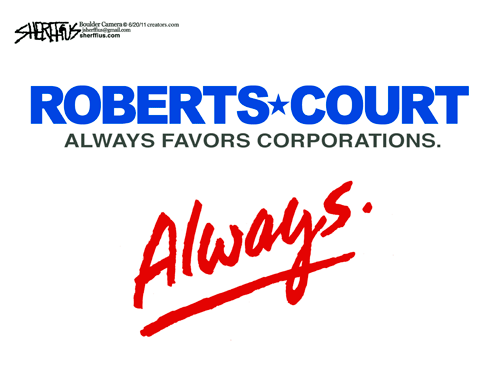In January of 2010, the US Supreme Court handed down its decision in Citizens United v. Federal Election Commission that held that the First Amendment prohibited the government from restricting independent political expenditures by corporations and unions. However, the case did not involve the federal ban on direct contributions from corporations or unions to candidate campaigns or political parties, which remain illegal in races for federal office.
Once again the US Supreme Court is about to weigh in on campaign finance agreeing to hear arguments in the McCutcheon v. Federal Election Commission which contends that limits on what individuals are allowed to give candidates and parties and PACs is an unconstitutional violation of the individual donor’s free speech rights.
Supreme Court Takes Campaign Finance Case, Will Rule On Contribution Limits
by Paul Blumenthal, The Huffington Post
The U.S. Court of Appeals already ruled in favor of keeping the biennial limits, which have been in place since 1971 and were upheld in the 1976 Buckley v. Valeo case. By accepting the case, the Supreme Court is stepping into the thick of another controversial campaign finance case just three years after ruling in Citizens United v. FEC that corporations and unions can spend freely on elections. [..]
Campaign finance reformers are already calling on the court to maintain the Buckley precedent and rule against the challenge in McCutcheon, for fear that any overturning of Buckley will eventually lead to future erosion of contribution limits and other campaign finance precedents meant to protect against corruption or the appearance of corruption. [..]
A ruling to overturn the biennial limits would not directly affect the amount an individual donor could give to a single candidate, but, thanks to the proliferation of joint fundraising committees, known as victory funds or committees, a candidate could potentially solicit a single contribution from one donor of up to — if not more than — $3,627,600.
In a recent segment of Moyers & Company, host Bill Moyers discussed how “big money” is destroying democracy with Dan Cantor, Executive Director of New York’s Working Families Party, and Jonathan Soros, co-founder of the Friends of Democracy super PAC and a Senior Fellow at the Roosevelt Institute.
“There’s so much money being spent, there’s so much cynicism about the system, but the evidence shows, in states that do have public financing systems, that candidates can run in those systems and win, and they do it by focusing on their constituents and small donors,” Soros tells Bill.
Soros and Cantor advocate for a New York State public financing system inspired by New York City’s publicly-funded program that makes it less financially prohibitive to run for city-wide office. “People should appreciate who gets to run for office when you have a system like this. Librarians run for office, ex-teachers run for office – not just people who have a rolodex of prospective donors,” Cantor says. “It’s good for the candidates and the voters alike.”
The Super PAC That Aims to End Super PACs
by Michael D. Shear, The New York Times
In the next four months, Mr. Soros and a small team at Friends of Democracy, the new Super PAC, are going to pick 10 to 15 House lawmakers whose records and public statements have not been supportive of what Mr. Soros calls a system of “citizen-led” elections.
In those districts, the new Super PAC will produce direct mail, telephone calls, Internet advertising and even a few television commercials aimed at making sure voters know the positions of the lawmaker
In addition, a separate sister organization will be picking a handful of campaign finance reform “heroes” who will receive some direct contributions to reward them for their positions.
If all goes according to plan, Mr. Soros is hoping to eventually demonstrate to politicians that there is a political cost for standing in the way of reform.
For sale to the highest bidder, the Unites States of America.

 Once again the corporate owned, conservative Supreme Court has
Once again the corporate owned, conservative Supreme Court has  Now more than ever, the reason for
Now more than ever, the reason for
Recent Comments